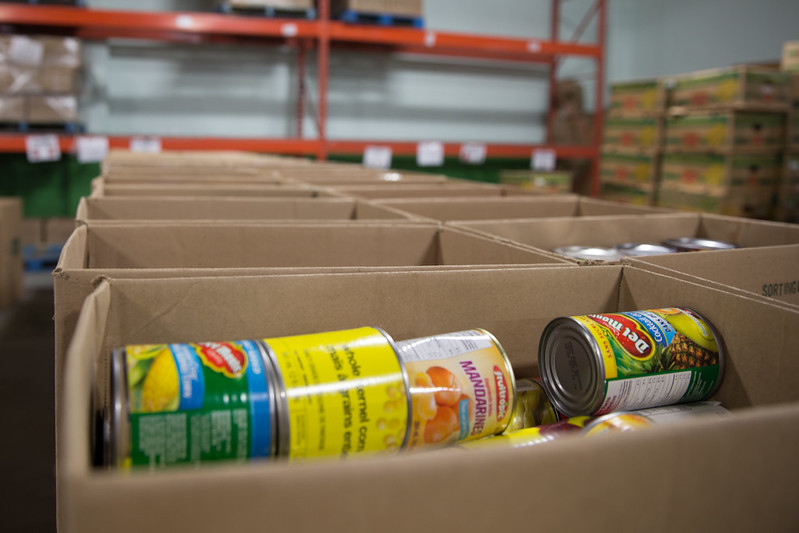Findings from our first Community Spotlight Workshop
By Gabriela Loureiro

Community organisations helped migrants in precarious situations by providing food and help to access services. Credit: Mack Male/Flickr
In our first Community Spotlight Workshop, our team had the opportunity to learn about diverse migrant experiences of the pandemic through the insights of 18 stakeholders from third sector organisations and community groups providing advice and services including food, accessing housing, student and immigration rights. This workshop is part of the Connecting During Covid (CDC) project, funded by the Economic and Social Research Council, which is exploring practices of care, remittance sending and digitisation among Brazilian, Indian and Somali migrant communities in the UK.
Through conversations with community representatives, we were able to learn a lot about the ways in which Covid-19 has intensified the already difficult conditions of many migrants across communities, significantly affecting people’s capacities to remit and provide care for their families. Economic, social and health-related hardships were reported across the three communities, resulting in food shortages, difficulties in paying rent and also meeting other basic expenses.
Increased precarity
Migrants who were in low-paid, precarious and/or informal work did not have access to government support and were left in a state of deepened vulnerability. This is illustrated by a Brazilian community participant who noted “those without work, which is different than losing a job, couldn’t afford food and housing right at the beginning. It was a snowballing effect: as the lockdown continued, the number of people asking for help increased”. Many with unsettled immigration status were forced to return to their home countries. The ongoing financial difficulties led to people being evicted, having nowhere to go and unable to work and sustain themselves and their families. A member of the Somali community highlighted that “eviction was banned but people still face evictions, their things were thrown out”.
Gender and age emerged as key factors exacerbating precarity, with women and elderly disproportionately affected by the pandemic. Many mothers have been struggling to manage childcare alongside working from home, or have been forced to quit their jobs, participants reported. Incidents of domestic violence are also said to have peaked and with increased intensity. “Domestic violence incidents are very high and got worse over the last four-month period within the undocumented migrant community”, said a representative of an Indian organisation. The elderly were identified as particularly suffering from isolation, leading to community organizers having additional provisions to protect their mental health. This included, but was not exclusive to, increased socially distant visits on culturally relevant occasions, as mentioned by Indian community representatives.
All these problems have affected remittance dynamics significantly. In many cases, remitting to support family abroad has become increasingly difficult since migrants were compelled to focus on their survival in the UK. As such, they are unable to support their families back home leading to a significant negative impact on their mental health and sense of worth. Settled migrants also suffered as many saw their income dropping, leaving them unable to provide care for their families. “The ones that were documented also suffered because being in furlough, they had a cut of 20% in their salary and this 20% could be exactly the money they sent to Brazil to their families”, said a representative of the Brazilian community.
Government and community support
Participants reported problems in accessing government and institutional support. According to one organisation that gives immigration advice to the Brazilian community, undocumented migrants are being turned away by GP practices, and are therefore unable to access the Covid-19 vaccine. Many criticised the complexity of the furlough scheme and access to universal credit, a problem magnified by language barriers. “We received so many phone calls from people who didn't understand what was happening. Mainly those who experienced war and collapse before, really didn't know what was going to happen, and wanted reassurance”, said a member of a Somali organisation.
Despite the lack of governmental support, it was documented that there was unprecedented mobilisation from the communities to find creative ways to sustain support and care. Community organisations and individual acts of charity played a vital role in the frontline, with a significant focus on providing food. Another vital role of community organisations has been translation, signposting and facilitation, making support systems accessible.
We are extremely grateful to the community organisers who attended our workshop and provided such pertinent insights about the situation of Brazilian, Indian and Somali migrants during the pandemic. This workshop has offered a detailed insight into the numerous ways in which the pandemic has disrupted people’s capacities to give and receive care, and how socio-economic inequalities were increased during the crisis.
A full report of this Community Spotlight Workshop will be published on our website shortly. Please follow us on social media to keep informed about our findings!